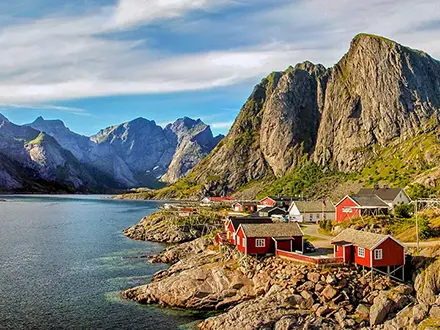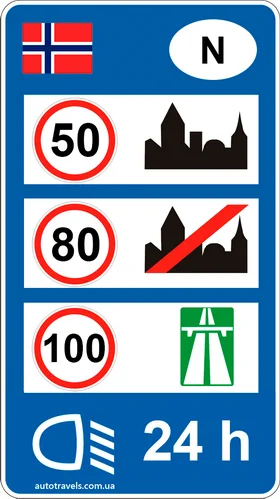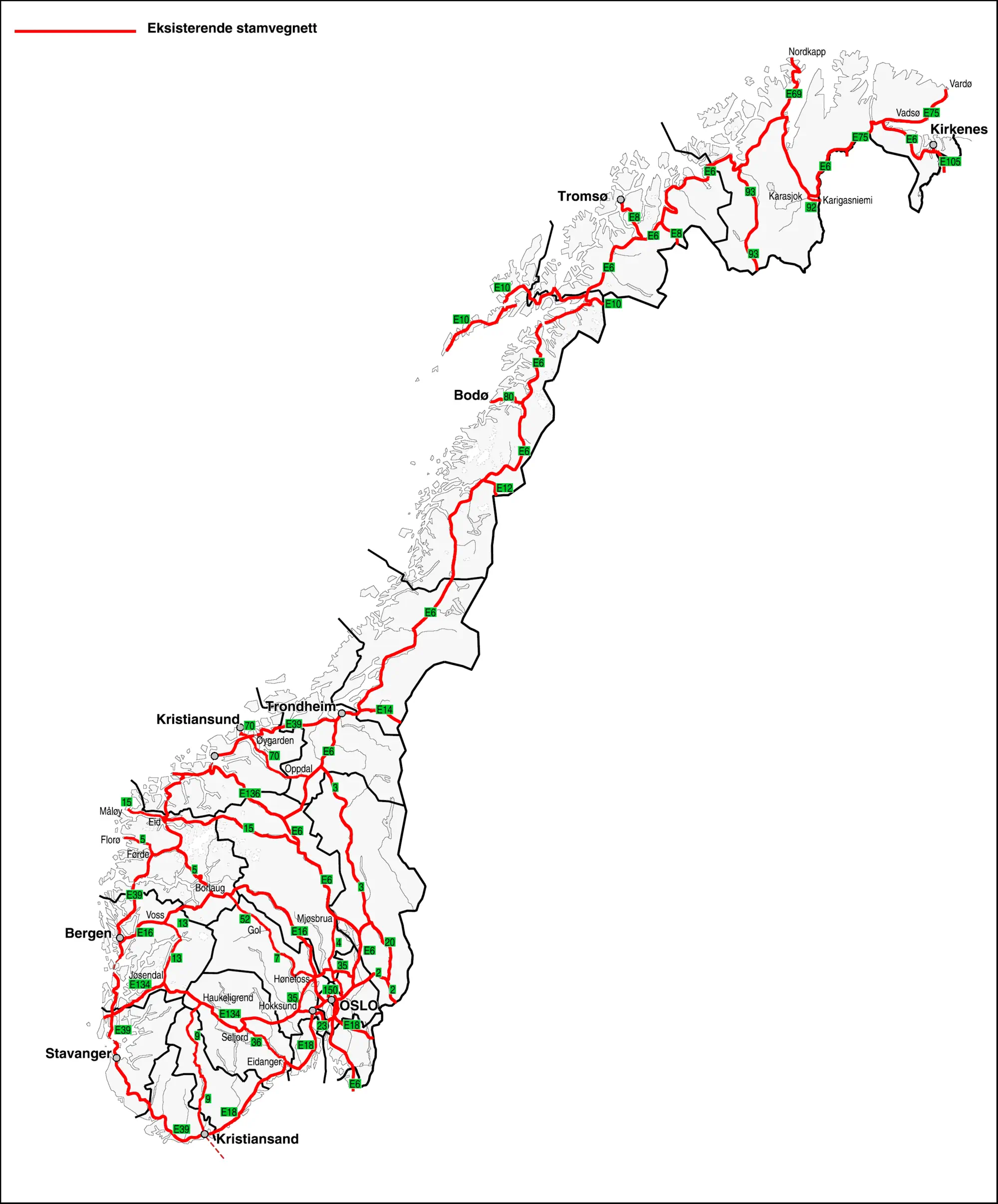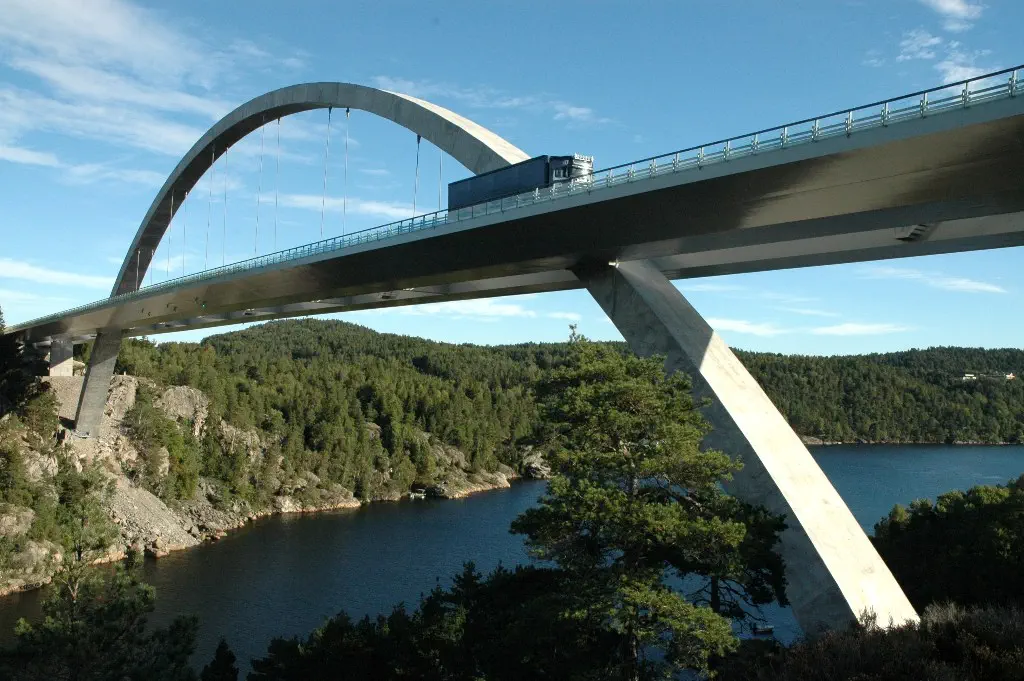
 Norway
Norway
- TitleColor: #333333
- DateColor: #999999
- SizeFont: 60
- FlagImg URL: /images/flags/Flag_of_Norway.svg
- TitleImageSizes: 1900,1440,720
Norway – Contents
General Information Toll Roads Speed Limits Petrol Parking Insurance Car Equipment TiresGeneral Information
Information about roads, speed limits, mandatory car equipment, and some rules of the road. More detailed information about toll roads, petrol costs, parking, speed limits, etc., can be found in the sections below.
| Payment for roads based on the distance traveled at special control points and through electronic payment systems. | |
 |
In populated areas – 50 km/h Outside populated areas – 80 km/h Motorway – 100 km/h Dipped headlights are mandatory at all times. |
| Maximum alcohol level 0.2 ‰ Talking on the phone while driving is prohibited. |
|
| Winter tires are not mandatory but recommended, Chains are necessary on snow or ice, Studded tires are allowed from November 1 to the first Sunday after Easter. |
|
Mandatory equipment:
|
|
| Seat belts are mandatory for all passengers. Child seats/boosters are mandatory for children under 150 cm. |
Toll Roads
Roads in Norway are paid based on the distance traveled, and the payment depends on the category of the vehicle. Of the 45 toll roads, 25 have electronic barriers that can be used by foreign tourists.
All foreign and domestic vehicles must pay road tolls in Norway.
Map of Toll Roads in Norway

Payment Methods for Roads in Norway
This applies to all vehicles weighing up to 3500 kg. The country provides three payment options:
AutoPASS
Sign an agreement with a toll service provider and get a payment tag (special device).
- You receive a payment tag that needs to be installed on the inside of the car's windshield.
- You receive discounted rates for passage (for vehicles up to 3500 kg).
- The correct toll will be deducted based on the environmental data of your car (i.e., diesel, petrol, zero emissions, etc.).
- You will have different payment options depending on which toll service provider you register with. Common options include an invoice and a credit card.
If you choose this option, you should select one of the toll service providers listed here: https://www.autopass.no/en/user/contact-a-toll-service-provider/. The toll service provider will also register the environmental data of your car when you sign a user agreement.
It is not possible to obtain a payment tag for a passenger car at Norwegian border crossings. Toll tags are available at the border only for heavy vehicles over 3500 kg.
Epass24
Register an account with Epass24 without a tag.
- You will be charged for passage at each toll station (no one-hour rule).
- You will not receive any discounts on toll fees.
- You will not receive reduced toll rates applied to zero-emission vehicles.
- You can receive electronic invoices to view them anywhere.
- You will receive invoices faster than if you choose option 3.
- The correct toll will be deducted based on the environmental data of your vehicle running on fossil fuels, provided that you also separately register the environmental data of your car at www.autopass.no/ed.
- You have the option to pay by invoice or credit card.
If you choose this option, you must register on the website www.epass24.com.
No Action
Drive without taking any action. With this option:
- You will be charged for passage at each toll station (no one-hour rule).
- You will not receive any discounts on toll fees.
- There will be no monthly payment limit (no monthly payment limit).
- You will not receive reduced toll rates applied to zero-emission vehicles.
- The highest tariff for your vehicle class will be charged. However, to charge the correct toll, you can register your car's environmental data at www.autopass.no/ed without a user account.
- The vehicle owner will receive invoices from Epass24 with payment options via bank or credit card.
You choose this option without taking any action.
More details can be found in English on the Autopass website: https://www.autopass.no/en/user/foreign-vehicles/
Entry to the center of some Norwegian cities is subject to a fee. Entry fees to city centers in 2023:
| City | Vehicle | |||
| Up to 3.5 t | Up to 3.5 t (rush hours) | Over 3.5 t (EURO-6) | Over 3.5 t (rush hours) (EURO-6) | |
| Oslo / Bærum | 29 NOK (2.50 €) | 35 NOK (3 €) | 91 NOK (7.70 €) | 108 NOK (9.20 €) |
| Kristiansand | 16 NOK (1.40 €) | 24 NOK (2.05 €) | 26 NOK (2.20 €) | 40 NOK (3.40 €) |
| Nord Jæren | 25 NOK (2.10 €) | 25 NOK (2.10 €) | 62 NOK (5.30 €) | 62 NOK (5.30 €) |
* - Rush hours (06:30-09:00 and 14:30-17:00), higher tariff applies.
Motorcycle travel to the city center is free.
All detailed rates can be viewed on the following websites:
Oslo: https://www.fjellinjen.no/bompenger/takster
Kristiansand: https://ferde.no/en/toll-stations-and-prices/kristiansand
Nord Jæren: https://ferde.no/en/toll-stations-and-prices/nord-jaeren
Other cities: https://ferde.no/en/toll-stations-and-prices
Sections with Special Payment

Svinesund Bridge (E6 highway)
The Svinesund Bridge is an arch bridge spanning the Iddefjord in the Svinesund strait, marking the border between Sweden and Norway. The bridge is part of the E6 road from Oslo to Gothenburg, with a total length of 704 meters and two lanes in each direction.
| Vehicle Type | Toll Cost | |
 | Motorcycle | 0 |
 | Passenger Car | 20 NOK (1.70 €) |
 | Vehicles over 3.5 tons | 100 NOK (8.50 €) |
Bridge location on Google Maps: Svinesund Bridge
Closure of Highways in Norway in Winter
Some highways in Norway close during winter. They may be closed for various periods depending on the weather.
The list of closed roads can be found on the website:
https://www.vegvesen.no/trafikkinformasjon/reiseinformasjon/fjelloverganger/#/
Speed Limits

Standard speed limits in Norway (unless otherwise indicated by road signs).
Cars, motorcycles:- In populated areas – 50 km/h
- Outside populated areas – 80 km/h
- On motorways – 100 km/h
- In populated areas – 50 km/h
- Outside populated areas – 80 km/h
- On motorways – 80 km/h
Minimum allowed speed on motorways – 40 km/h
Dipped Headlights
Dipped headlights are mandatory throughout the year, 24 hours a day.
Cost of Petrol in Norway
Parking in Norway
On weekdays, street parking in cities is usually paid, as well as in most parking lots. Payment is not required unless explicitly stated.
The most common system used in Norway is automated parking (P-automat). To use this system, you first need to park your car, then exit and purchase a parking ticket at the nearest P-automat (rectangular gray machine that accepts coins of 1, 5, 10, and 20 kroner or credit cards). Then, place the ticket on the dashboard under the windshield.
Garages (P-hus) are also common in cities. Upon entering a garage, a ticket is taken, and payment is made at the machine when leaving the garage.
Parking in Oslo
In Oslo, street parking is usually municipal, while parking lots are typically private. Parking lots can be both private and municipal.
Municipal (Public) Parking
Municipal parking is divided into zones with different prices and time restrictions. In the city center, parking is usually paid from Monday to Saturday, from 9 am to 8 pm. Outside these hours, it is usually free. There are several free and paid zones on streets outside the city center. Payment methods typically include coins, credit cards, and the Bil i Oslo app.
According to the mobile app, prices range from 83 NOK (7.05 €) in the city center to 36 NOK (3.06 €) further from the center.
Private Parking
Parking in private garages, parking lots, and spaces requires ongoing payment. Most of them belong to TimePark, OnePark, Q-Park, or EuroPark.
More information can be found on the website: https://www.oslo.kommune.no/english
Mandatory Equipment
Equipment required to have in the car:| Emergency stop sign | |
| Reflective vest – a reflective vest is mandatory for anyone exiting the car, during the day(!) or at night in case of a stop or accident. The vest should be inside the car, not in the trunk. |
| Fire extinguisher | |
| Spare bulbs |
Winter Tires, Studded Tires, Chains
| Winter tires are not mandatory, but during the winter, the tread depth must be at least 3.5 mm, and in the summer, not less than 1.6 mm. | |
Chains are necessary on road sections covered with snow or ice. There may be checks at the border to see if you have chains.
 |
|
| Studded tires are allowed from November 1 to the first Sunday after Easter.
Vehicles equipped with studded tires incur a fee for entering Oslo, Bergen, and Trondheim
(NOK 30 (€ 2.6) per day, NOK 400 (€ 34) per month, and NOK 1,200 (€ 103) per year).
In the northern districts of Nordland, Troms, and Finnmark, studded tires are allowed from October 15 to May 1. If the road is covered with snow and ice, studded tires and chains are allowed outside these dates. |
 travels
travels Albania
Albania Andorra
Andorra Austria
Austria Azerbaijan
Azerbaijan Belarus
Belarus Belgium
Belgium Bosnia and Herzegovina
Bosnia and Herzegovina Bulgaria
Bulgaria Croatia
Croatia Cyprus
Cyprus Czech Republic
Czech Republic Denmark
Denmark Estonia
Estonia Finland
Finland France
France Georgia
Georgia Germany
Germany Greece
Greece Hungary
Hungary Iceland
Iceland Ireland
Ireland Italy
Italy Kosovo
Kosovo Latvia
Latvia Liechtenstein
Liechtenstein Lithuania
Lithuania Luxembourg
Luxembourg Malta
Malta Moldova
Moldova Monaco
Monaco Montenegro
Montenegro Netherlands
Netherlands North Macedonia
North Macedonia Poland
Poland Portugal
Portugal Romania
Romania Russia
Russia San Marino
San Marino Serbia
Serbia Slovakia
Slovakia Slovenia
Slovenia Spain
Spain Sweden
Sweden Switzerland
Switzerland Turkey
Turkey Ukraine
Ukraine United Kingdom
United Kingdom